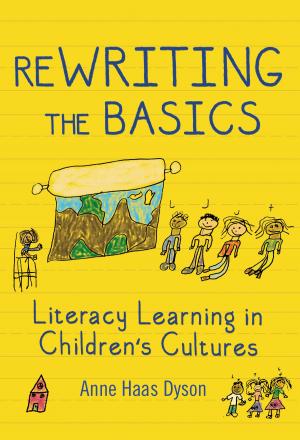Infants and Toddlers at Work
Using Reggio-Inspired Materials to Support Brain Development
Nonfiction, Reference & Language, Education & Teaching, Educational Theory, Curricula| Author: | Ann Lewin-Benham | ISBN: | 9780807773376 |
| Publisher: | Teachers College Press | Publication: | December 15, 2009 |
| Imprint: | Language: | English |
| Author: | Ann Lewin-Benham |
| ISBN: | 9780807773376 |
| Publisher: | Teachers College Press |
| Publication: | December 15, 2009 |
| Imprint: | |
| Language: | English |
This book contains a wealth of practical and specific activities and materials to use with infants and toddlers to enhance growth and development. Writing in the accessible style that her readers appreciate, Ann Lewin-Benham looks at current research from the neurosciences to show what teachers and childcare providers can do with very young children. For each material or activity presented, the text examines its relation to the rapid brain growth that characterizes the zero to three years, including sensory reception, movement, language, cognition, memory, vision, and motivation. Materials, with guidance for their use and where to find them, include: paint, mark-makers, man-made found objects, natural objects, clay, paper, and light and shadow. This is the definitive guide for trainers and professionals who work with young children.
“This book does not patronize or talk down to the reader—it assumes that teachers and parents are eager to think hard about how the brain works and children learn. The information is scientifically up-to-date, and its implications for education are stimulating to laypersons and professionals alike. Reading this book will forever change the way you think about how children learn.”
—From the Foreword by Mihaly Csikszentmihalyi, Claremont Graduate University
“Ann Lewin-Benham’s book represents an extraordinarily comprehensive yet usable guide to the neuroscientific state-of-the-art in infant and toddler cognitive development. Full of practical recommendations for engaging young children’s brains with the physical world around them, this volume will connect strongly with educators and caregivers alike.”
—Mariale Hardiman, Interim Dean, School of Education, Johns Hopkins University
“As we learn more and more from neuroscience about the development of the infant brain, two things have become clear: how competent babies are, and how much they depend on relationships to frame their early development. In her new book Ann Lewin-Benham helps us to understand how to respectfully relate to the developing brain.”
—J. Ronald Lally, Co-Director, Center for Child & Family Studies, WestEd
This book contains a wealth of practical and specific activities and materials to use with infants and toddlers to enhance growth and development. Writing in the accessible style that her readers appreciate, Ann Lewin-Benham looks at current research from the neurosciences to show what teachers and childcare providers can do with very young children. For each material or activity presented, the text examines its relation to the rapid brain growth that characterizes the zero to three years, including sensory reception, movement, language, cognition, memory, vision, and motivation. Materials, with guidance for their use and where to find them, include: paint, mark-makers, man-made found objects, natural objects, clay, paper, and light and shadow. This is the definitive guide for trainers and professionals who work with young children.
“This book does not patronize or talk down to the reader—it assumes that teachers and parents are eager to think hard about how the brain works and children learn. The information is scientifically up-to-date, and its implications for education are stimulating to laypersons and professionals alike. Reading this book will forever change the way you think about how children learn.”
—From the Foreword by Mihaly Csikszentmihalyi, Claremont Graduate University
“Ann Lewin-Benham’s book represents an extraordinarily comprehensive yet usable guide to the neuroscientific state-of-the-art in infant and toddler cognitive development. Full of practical recommendations for engaging young children’s brains with the physical world around them, this volume will connect strongly with educators and caregivers alike.”
—Mariale Hardiman, Interim Dean, School of Education, Johns Hopkins University
“As we learn more and more from neuroscience about the development of the infant brain, two things have become clear: how competent babies are, and how much they depend on relationships to frame their early development. In her new book Ann Lewin-Benham helps us to understand how to respectfully relate to the developing brain.”
—J. Ronald Lally, Co-Director, Center for Child & Family Studies, WestEd















